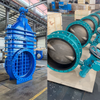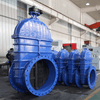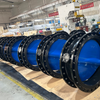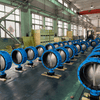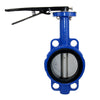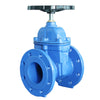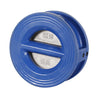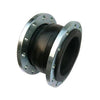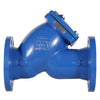How to Choose Between Flanged and Socket Weld Gate Valves for Industrial Pipelines
In industrial piping systems, gate valves play a critical role in controlling the flow of media and ensuring overall system safety. Among the key design details, the method used to connect the valve—though it may seem minor—can significantly impact sealing performance, maintenance costs, and even the risk of system failure.
Flanged gate valves and socket-weld gate valves each offer unique advantages due to their different connection methods. Choosing the right type not only affects the safety and stability of the system but also directly influences long-term maintenance costs and operational efficiency. Flanged or socket-weld—which is the better choice? We hope this article helps you decide.
Comparison of Flanged and Socket-Weld Gate Valve Connections
Flanged Gate Valve: Installed using bolts that secure two flange faces together. A gasket is placed between the flanges to ensure a tight seal.
Socket-Weld Gate Valve: Connected by inserting the pipe directly into the valve’s socket end, followed by welding to achieve a permanent seal.

Pros and Cons of Flanged vs. Socket-Weld Gate Valves
Flanged Gate Valve
Advantages
Ease of Installation and Removal:
The flanged connection design allows for relatively simple installation and removal. To install, align the valve’s flange with the pipe flange, insert the bolts, and tighten the nuts. To remove it, simply reverse the steps. This convenience is particularly valuable during maintenance and repair of large pipeline systems. For example, in a municipal water supply pump station, if a valve needs to be replaced, a flanged connection allows quick disassembly without significantly disrupting the entire system.
High Versatility:
Flanged connections are suitable for pipelines of various diameters and pressure ratings. Whether it's a small-diameter, low-pressure line or a large-diameter, high-pressure system, appropriate flanges and valves can be matched accordingly. This wide adaptability has made flanged valves a common choice across many industrial applications.
Disadvantages
Weight and Space Requirements:
Due to the presence of flanges and bolts, flanged valves tend to be bulkier and require more installation space. In confined or complex piping layouts, this can pose challenges for both design and installation.
Higher Cost:
The manufacturing of flanged valves is more complex and requires matching bolts and gaskets, which increases production costs. Additionally, installation often demands more labor and time, especially for tightening multiple bolts, further raising the overall installation cost.
Seal Integrity at High Temperatures:
In high-temperature environments, the sealing performance of flanged connections may degrade. Because different metal components expand at different rates, rising temperatures can alter the bolt tension, potentially compromising the gasket seal and leading to leaks. High-temperature gaskets and regular bolt re-tightening are often necessary to maintain sealing performance under thermal expansion.

Socket-Weld Gate Valve
Advantages
Excellent Sealing Performance
Socket-weld gate valves are connected to the pipeline via welding, forming a unified structure with high connection strength and outstanding sealing performance. In soft-seated designs, the gate is often coated with rubber, which tightly presses against the valve seat when closed—further enhancing the seal. This makes them especially suitable for clean media or applications where internal leakage must be avoided.
Compact Structure, Space-Saving Installation
Without the need for flanges and bolted components, socket-weld gate valves are more compact and lightweight. They are ideal for piping systems with limited space. For instance, in the steam auxiliary systems of marine engine rooms, where piping is densely packed and complex, using socket-weld gate valves helps reduce spatial footprint and avoids interference with other equipment.
Lower Long-Term Maintenance Costs
Socket-weld valves eliminate the need to purchase flanges, bolts, and gaskets at the installation stage, reducing initial material costs. Moreover, the welded connection provides excellent long-term reliability, significantly reducing routine maintenance requirements.
Disadvantages
Difficult to Disassemble, High Maintenance Cost
Because the welded connection is permanent, the valve cannot be easily removed. Replacing or repairing the valve requires cutting the pipeline, which not only increases maintenance time and costs but may also risk damaging nearby piping or equipment.
Limited to Small-Diameter Applications
Due to welding process limitations and stress distribution concerns, socket-weld gate valves are typically suitable for small-diameter pipelines—usually DN50 (2 inches) or below. Using them in larger systems may lead to deformation of the valve body caused by localized overheating during welding.
High Dependence on Welding Quality
Proper installation requires skilled welders and specialized equipment. The welding process must be carefully controlled to ensure quality. If the welds are substandard, it can introduce safety risks and compromise system integrity.

Summary of applicable scenarios of flange gate valves and socket gate valves
|
Consideration |
Recommended Valve Type |
Reason |
|
Municipal water supply, cooling systems |
Flanged gate valve |
Easy to install/replace; compatible with various diameters and pressures |
| High-pressure, high-temperature sealing |
Socket-weld hard-sealed gate valve |
Welded connection ensures leak-free performance under extreme conditions |
|
Space limitations |
Socket-weld gate valve (small-diameter) |
Compact structure saves space in tight layouts |
|
Frequent maintenance or flexible replacement |
Flanged gate valve |
Easy to disassemble, saving time and labor during upkeep |
|
Corrosive media |
Flanged gate valve (with gasket customization) |
Anti-corrosion options via gasket material selection |
Thank you for reading.We hope this article has been helpful in guiding your valve selection process. If you’re currently looking for a reliable gate valve supplier, consider Union Valve. As an experienced and professional manufacturer, we offer customized solutions along with exceptional product quality and after-sales service. Whether you need flanged or socket-weld gate valves, Union Valve can provide designs and technical support tailored to your specific operating conditions.
Related Article:


